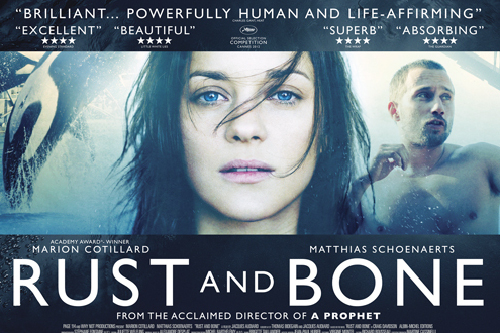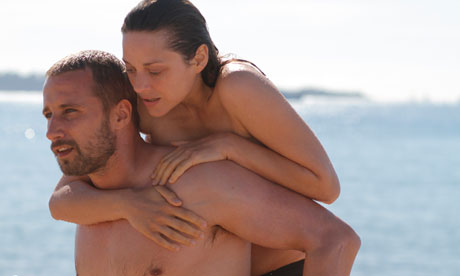Put in charge of his young son, Ali leaves Belgium for Antibes to live
with his sister and her husband as a family. Ali's bond with Stephanie, a
killer whale trainer, grows deeper after Stephanie suffers a horrible
accident.
'I'm OP' replies the man blankly as he stares at the woman across the table when she questions their sexual relationship. He is Ali, she is Stephanie, 'Op' is their code word for hooking up. Both are marked by scars, physically and emotionally, but it was those scars that brought them together, now it threatens to shift them apart. Bones may break, rust may show, but wounds can heal, such is the tone for Audiard's nuanced drama about the human condition.
Jacques Audiard has been considered by some a new-generation Dardenne for his previous films A Prophet and The Beat that My Heart Skipped. Although I see the connection, I feel it is a little misjudged. Where the brothers flatten their images, removing expression in the sytle of Bresson. Here Audiard basks his in sun-baked light and natural colours that reminisce of a more gentle Scorsese, almost to the point of indulgence. Ali's underground bare knuckle boxing fight may be suitably grimy and unflinchingly violent, but it's captured with a grace one would attribute to... Oh say... Orca whales gliding through the ocean with a elegant, unstoppable power. The connection is intentional, Ali is himself an Orca - capable of great damage but houses a capacity for gentleness. He struggles to process his emotions, but is also practical, kind and in ways remarkable, but he distances himself because of what he can do. His lover Stephanie carries the scars of one Orca, for Ali it is all-to-great of a reminder.
Rust and Bone is, first and foremost, a performance piece. Marion Cotillard is remarkable as a woman who has been stripped of her life. In a conversation between the two she admits to enjoying being watched, going to nightclubs in order to entice the eyes of men, now she is reduced to a cripple gawked at by bathers on the beach. The film is light on emotional outbursts, save for one devastating scene where she wakes up in hospital only to discover her legs have been amputated, but it is through her movements and gestures, her posture and expressions that she sells her character's depression before gradual acceptance and reintegration into life. By contrast, Matthias Schoenaerts' Ali is a man of unapologetic physicality. He inhabits most of the frame, cutting through each shot with force and unpredictability. Yet, as he demonstrates in a scene in which he carries Stephanie into the ocean for a much needed, liberating swim, he is capable of a cumbersome gentleness. Both are worthy of the inevitable Oscar nomination they will, or at least should, receive.
The film is carried by these fragile interactions between the two. One such example would be when Stephanie accepts Ali's offer of sex, 'to see if it still works,' she removes her tights, timidly at first before unraveling to unveil a sensuality that she so previously exuded. Through the intimate camera and the low key ambiance of the soundtrack we not simply observe but feel the subdued passions that slowly overwhelm first Stephanie then eventually Ali.
Unfortunately Audiard's drama doesn't match his character's restraint, skating around and occasionally dipping into the realm of implausibility it creates an uneasy level of inconsistency. Early on, in a bid to feed his hungry son, Ali is shown stealing a from an electronics shop. It is only a few hours later they are picked up by his sisters husband and taken to a house and fed. A rather rash, unjustified action all things considered. The son isn't really given enough attention to warrant his existence in the first place, instead he serves as a device to illustrate Ali's emotional distance and fearsome destruction and Stephanie's relationship. The most contrived sequence comes during one of the bear knuckle fight sequences as a battered Ali looks down for the count until Stephanie shows up and inspires him to victory, not so much a moment of euphoria as a rejected scene from a Rocky sequel. To frequently does Audiard give way to melodrama this way, and ultimately the film's impact suffers.
There is a minor potency here that is much admired, but it is wrapped in a somewhat misguided screenplay, resulting in a noble miss-fire. Audiard's direction is assured undoubtedly, but it is through the performances from Cotillard and Schoenaerts that we eventually give ourselves to the films tenderness. Like it's characters, the movie succeeds, wounded and bruised, but with bones (and rust) intact.




No comments:
Post a Comment